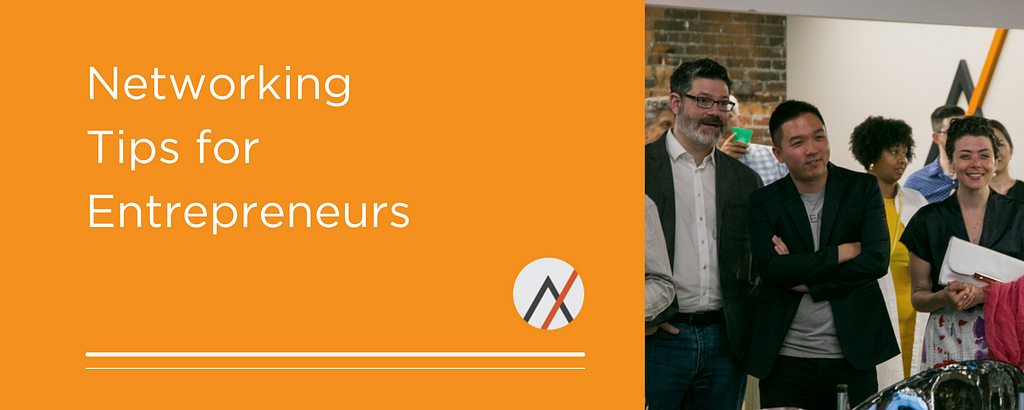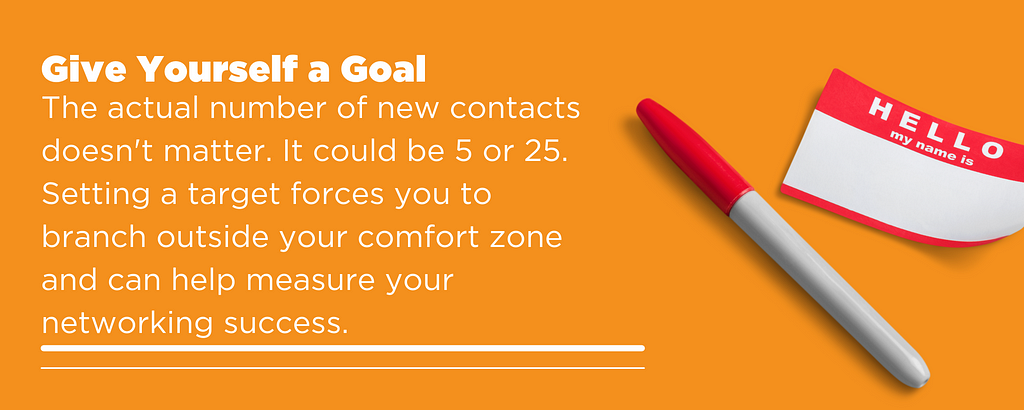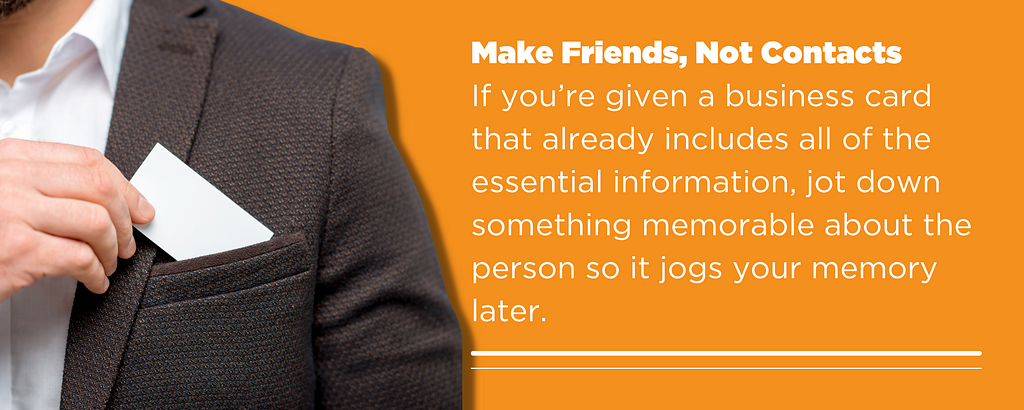What To Do Before, During, & After A Networking Event

Networking is crucial to any entrepreneur’s success, but there are no boxes to check off or steps to take that end with a successful networking gold star. How you choose to go about networking is up to you. The only thing you need to do to ensure that your networking is ultimately beneficial is to get yourself out there!
Like any other meeting or function, you need to prepare beforehand. Keep in mind that the whole point of a networking event is to get you and your brand out into the world and make meaningful connections with potential referrals, customers, or business partners. Therefore, not only will you need to present yourself well during the event, but before and after, too. Since networking is just one more task on your neverending entrepreneur to-do list, we’ve curated some resources to help you out. To get started, check out the quick tips below to help you before, during, and after a networking event, and then access our on-demand Networking for Entrepreneurs mini-course to create a personalized networking plan.
⭐ Entrepreneur Pro Tip from Nadyli Nuñez, Executive Director of Ascender: On days when I’m not feeling it but have to be there, I’ll set a timer for 15 minutes and a goal to start a conversation with one person. If I’m having an awful time after 15 minutes, I give myself permission to go home. 90% of the time, I stay.
BEFORE A NETWORKING EVENT
1. Sort Out Your Social Media
The whole point of networking is to make meaningful connections. Chances are, someone you talk to will go right to your social media pages. While most people maintain their professional persona on LinkedIn, neglecting other accounts like Facebook, Twitter, and Instagram could cost you some valuable PR points. This isn’t to say you can’t have a personal life but keep in mind that some stuff is better left offline. Try performing a social media self-audit to see how you size up and take care of any red flags before someone else finds them.
2. The Tried & True Art of the Business Card (Paper or Digital)
Business cards might feel old-fashioned, especially for younger entrepreneurs, but they remain a staple of a networker’s toolbox. First, you need an easy way to share your contact information. Even though digital business cards are becoming more popular (and easy to create & use), having a few paper cards is not a terrible idea. They remain the easiest way to share contact info (especially when WiFi is spotty or that app just doesn’t want to connect). So order some if you don’t have them already, and make sure you have plenty to go around.
While paper business cards are traditional, it doesn’t mean their design needs to be. Business cards are a great place to demonstrate your personal or company brand. Check out some of these creative business card designs for inspiration.
3. Practice (& Planning) Make Perfect
If you’re feeling nervous before a networking event, try rehearsing what you want to say. Rehearsing in front of the mirror, in the shower, or in the car on the way to the event are all great ways to smooth out your pitch and calm your nervous stomach. A well-thought-out elevator pitch that you can share in 60 seconds or less about yourself or your company can go a long way. Having a general sense of what to say allows you to skip some of the initial awkwardness and avoid searching for the right thing to say.
Besides practicing what you’ll say at a networking event, it’s also a good idea to do a little research beforehand. What will the event’s setup look like? Will there be formal speeches? What’s the event’s theme? Knowing this helps you tailor your elevator pitch and informs you on how you can benefit from the event. Google some of the event’s attendees if you can, and try to identify a few people with whom you know you’ll definitely want to talk. Going into a networking event with a game plan will ground your experience and help you leave with more meaningful connections.
⭐ Entrepreneur Pro Tip from Daniela Osio, founder of Kloopify: Networking can be hard, and it can be awkward. I like to prepare myself by reading The Awkward Networker. Doing this gets me in the right “networking mindset.” I’m also specific about the events I attend but open to any connection I make while I’m there. You never know who you’re going to meet; even if they do not help you today, they could know somebody or introduce you to somebody tomorrow. Networking is a muscle, it is important to train it frequently, and just like any muscle, it takes time and practice to really get good.
DURING A NETWORKING EVENT
Feeling a bit overwhelmed once you arrive is totally understandable, but it shouldn’t inhibit you from walking through the door. Here are a few tips to help you navigate networking events.
1. Give Yourself a Goal
A great place to start is the number of new people you want to meet. The actual number doesn’t really matter—whether it’s 5 or 25—but determining how many introductions you want to make and sticking to it will help you branch out of your comfort zone, especially if you are not a fan of talking to strangers.
While introducing yourself is a great exercise, it’s not always the best ultimate goal. In addition to your introductions, plan to have at least 3–5 meaningful conversations that are relevant to your goals. “Meaningful” means you are going beyond the simple introductions and discussing something relevant to you, your company, or your conversation partner and their company. These are where the real connections happen.

2. Bring a Pen and Paper
For many of us, the idea of note-taking, especially on paper, can seem a bit archaic. However, it’s the best way to maintain your attention while speaking. You don’t have to write down every word someone says, but jotting down a few quick notes will help you remember your meaningful conversations. Make sure you write down the person’s name, workplace/business, phone number, and/or email.
Why not use a phone? Chances are, it’s easier for you to write and listen than type and listen. Using a phone can also give off the wrong impression. You might leave someone thinking, “Is this person really texting while I’m having a conversation with them?”
3. Listen More than You Talk
The essence of networking is to make meaningful and mutually beneficial connections. While ambition is a powerful driving force, it can often lead to tunnel vision. You never want the conversation to be all about you. It’s important to have a conversation because you’ll definitely annoy folks if you talk about yourself the entire time.
While keeping sight of your goals, make sure you’re really hearing what the other person has to say. Try “active listening,” or truly internalizing what the other person is saying and communicating that you are interested and invested in the information.
While it’s important to introduce yourself and get your brand out there, it may come off as arrogant or selfish to simply launch right into your own life story. After you introduce yourself to someone, ask them some leading questions. Doing so can help you gauge their expertise and how best you might forge a meaningful connection.
⭐ Entrepreneur Pro Tip from Nadyli Nuñez, Executive Director of Ascender: I believe everyone has at least one thing that gets them excited to talk about or some particular expertise I never knew about (or one that may change my mind!) When it comes to networking, I turn it into a game where my mission is to discover the treasures in people. The benefit is that it forces me to approach conversations more interestingly to connect with others rather than make it a transactional or monotonous exchange. It’s a fun game!
AFTER A NETWORKING EVENT
Knowing what to do after a networking event is every bit as important as before and during. Here are some tips to finish strong:
1. Follow Up with a Quick Email
Your networking event shouldn’t exist in a bubble. What good is making a connection if you don’t follow through? While you don’t have to send an email to every person you met, anyone you had a meaningful conversation should receive a follow-up. A personalized message after the event conveys the sentiment that you paid attention during your conversation and intend to pursue a more meaningful connection. You also want to find a way to manage the new contacts you make; a simple spreadsheet will do the trick.
Your emails don’t need to be lengthy or pitchy. A simple, quick note to reintroduce yourself will be sufficient. In your email, reintroduce yourself, where you met, and a small detail from your conversation. It’s also a good idea to invite them to speak again (more on that below). Reminder: In addition to an email, make sure you add the person on LinkedIn.
2. Schedule Another Meeting
The entire purpose of networking is to make lasting connections. A great way to ensure your connection goes beyond one meaningful chat is to set up another time to talk. While a networking event serves as a platform to introduce yourself, a follow-up conversation allows you and your connection to dig a little deeper. Meeting one-on-one allows you to talk at greater length and fortify the link you’ve already made.
Regardless of your goals, this second meeting should still be informal. Approach networking as a way to make friends, not just contacts. There’s no reason to jump right into a conference room or send someone your resume just yet. Keep things conversational and open-ended. Grabbing lunch or coffee in a public place is your best bet. This helps keep pressure off the situation and allows both of you to speak comfortably.

3. Perform a Self-Evaluation
Don’t forget that networking is a continuous learning process. Whether it’s your first or thirtieth event, there’s always room for improvement. So spend time reflecting on your networking performance, introductions, and conversations. Here are some questions for your self-evaluation:
- How many introductions did you ultimately end up making?
- If it was less than your goal, is it because you stayed in more meaningful conversations?
- Did the event have the professionals or industries you wanted to connect with?
- Was your introduction well-rehearsed but also natural?
- How much time did you spend listening versus speaking?
- What can you do to make your next networking event even more successful?
4. Find Your Next Networking Event
Networking and building meaningful connections is not a one-and-done affair. Far from it! Finding meaningful networking events should be a career-long endeavor for every ambitious professional. There are plenty of resources to help you find events near you, or if you want to make networking a regular part of your week or month (which we highly recommend), consider joining a networking group.
⭐ Entrepreneur Pro Tip from Justin Forzano, Executive Director of Open Field: Finding folks doing similar work in the Pittsburgh area was challenging, so I found a lot of community at national and international conferences. Finding ways to combine my personal interests with work has really paid off. You never know where you might meet your next board member, employee, or funder.
READY TO NAIL YOUR NEXT NETWORKING EVENT?
One great way to keep up with your networking goals is right here at Ascender. We offer a number of monthly events geared toward helping you network and grow your business or company, plus an on-demand Networking for Entrepreneurs mini-course. Continue nurturing your network!
Connect with us
Learn more about Ascender: https://ascenderpgh.com/
Sign up for our newsletter or send us a note: info@ascenderpgh.com
Follow us: Twitter — Facebook — LinkedIn — Instagram
From fledgling tech companies, healthcare innovators, and nonprofits to makers, creators, services and shops, Ascender is for Pittsburgh’s entrepreneurs. We help businesses of all types in the Pittsburgh region start and build a business through education and connectivity. See how Ascender can help you.
Networking Tips for Entrepreneurs was originally published in Ascender on Medium, where people are continuing the conversation by highlighting and responding to this story.

